Entrepreneurial Ventures, Characteristics, and Personality Report
VerifiedAdded on 2021/02/19
|9
|2581
|24
Report
AI Summary
This report provides a comprehensive overview of entrepreneurship and small business management. It begins by defining entrepreneurship and its significance, then explores different types of entrepreneurial ventures and their relation to typology. The report delves into the characteristics, traits, and skills of successful entrepreneurs, using Henry Ford and Larry Page as case studies. It analyzes personality factors using the OCEAN model and discusses how background and experience can influence entrepreneurial success. The report also highlights the importance of small businesses and startups to the social economy, concluding that entrepreneurs transform ideas into reality, and that their success depends on various factors including their background and experience. References to relevant books and journals are included.
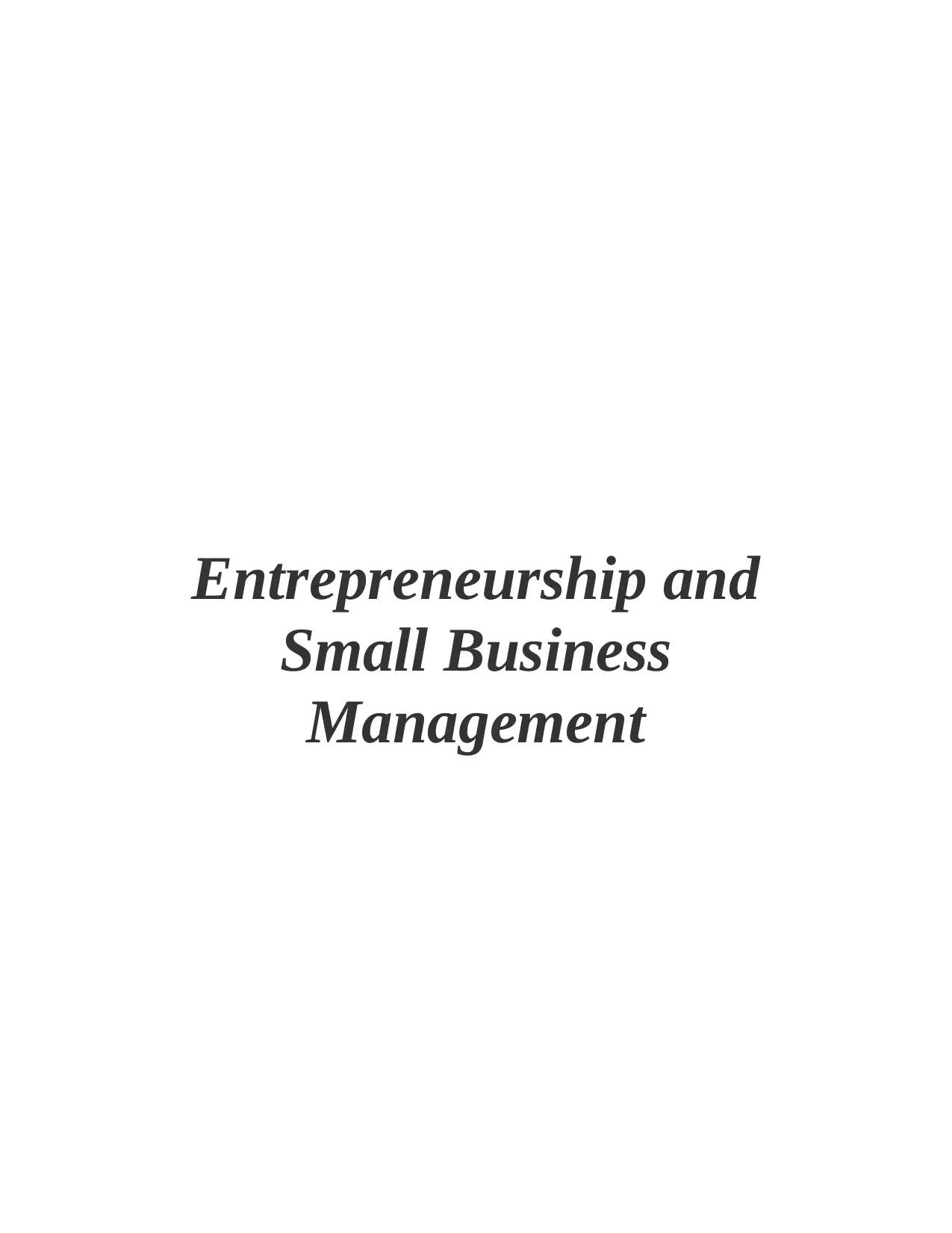
Entrepreneurship and
Small Business
Management
Small Business
Management
Paraphrase This Document
Need a fresh take? Get an instant paraphrase of this document with our AI Paraphraser
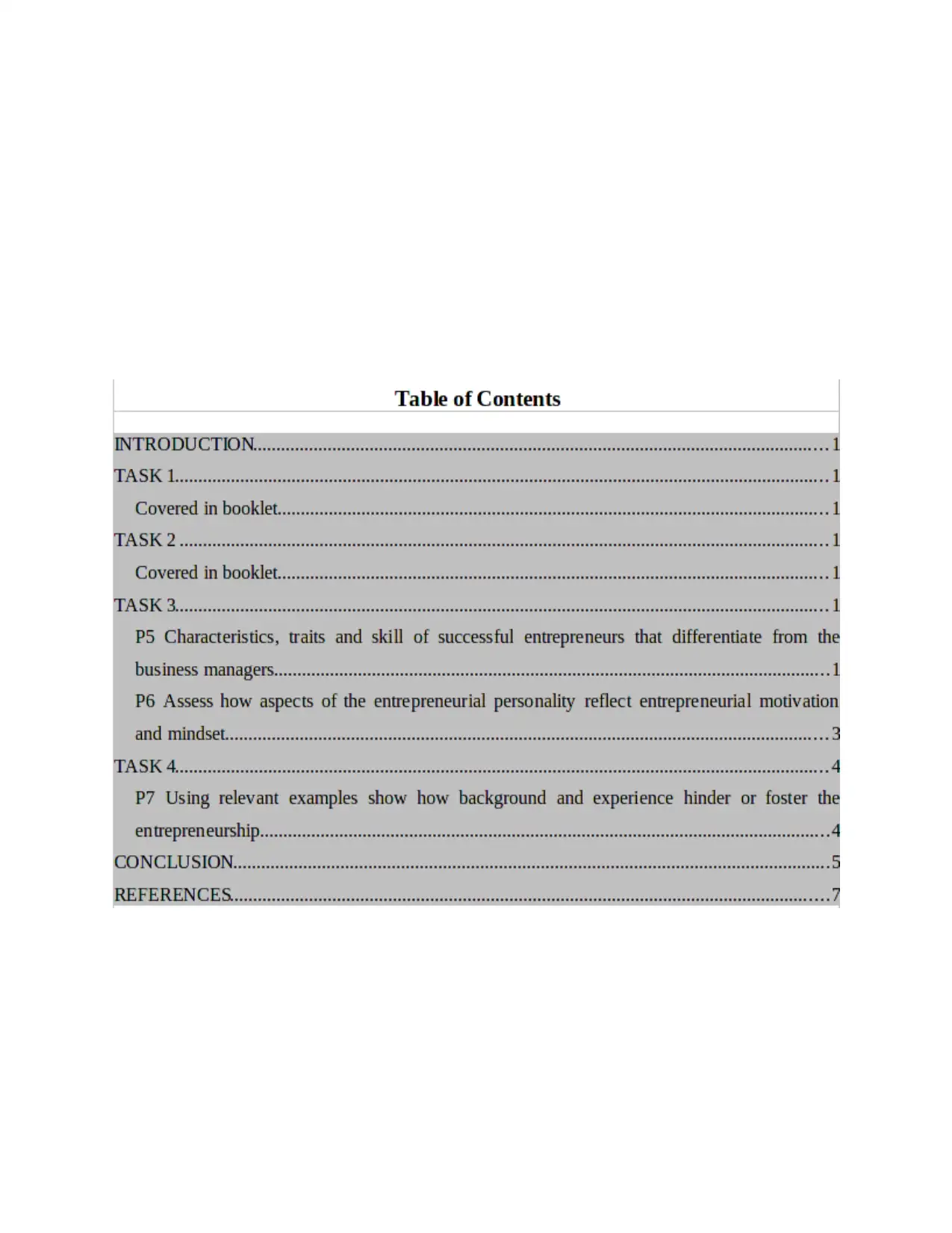
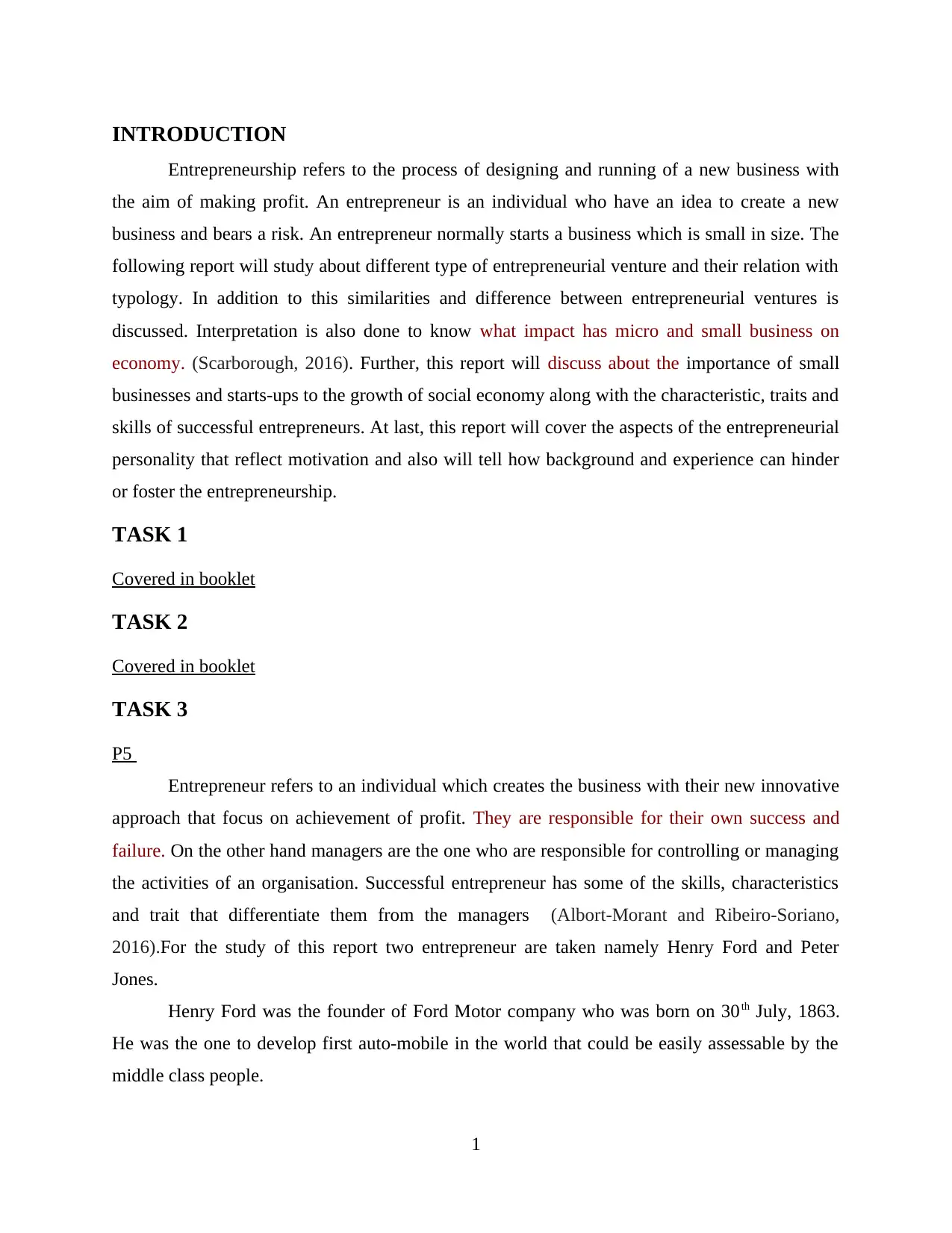
INTRODUCTION
Entrepreneurship refers to the process of designing and running of a new business with
the aim of making profit. An entrepreneur is an individual who have an idea to create a new
business and bears a risk. An entrepreneur normally starts a business which is small in size. The
following report will study about different type of entrepreneurial venture and their relation with
typology. In addition to this similarities and difference between entrepreneurial ventures is
discussed. Interpretation is also done to know what impact has micro and small business on
economy. (Scarborough, 2016). Further, this report will discuss about the importance of small
businesses and starts-ups to the growth of social economy along with the characteristic, traits and
skills of successful entrepreneurs. At last, this report will cover the aspects of the entrepreneurial
personality that reflect motivation and also will tell how background and experience can hinder
or foster the entrepreneurship.
TASK 1
Covered in booklet
TASK 2
Covered in booklet
TASK 3
P5
Entrepreneur refers to an individual which creates the business with their new innovative
approach that focus on achievement of profit. They are responsible for their own success and
failure. On the other hand managers are the one who are responsible for controlling or managing
the activities of an organisation. Successful entrepreneur has some of the skills, characteristics
and trait that differentiate them from the managers (Albort-Morant and Ribeiro-Soriano,
2016).For the study of this report two entrepreneur are taken namely Henry Ford and Peter
Jones.
Henry Ford was the founder of Ford Motor company who was born on 30th July, 1863.
He was the one to develop first auto-mobile in the world that could be easily assessable by the
middle class people.
1
Entrepreneurship refers to the process of designing and running of a new business with
the aim of making profit. An entrepreneur is an individual who have an idea to create a new
business and bears a risk. An entrepreneur normally starts a business which is small in size. The
following report will study about different type of entrepreneurial venture and their relation with
typology. In addition to this similarities and difference between entrepreneurial ventures is
discussed. Interpretation is also done to know what impact has micro and small business on
economy. (Scarborough, 2016). Further, this report will discuss about the importance of small
businesses and starts-ups to the growth of social economy along with the characteristic, traits and
skills of successful entrepreneurs. At last, this report will cover the aspects of the entrepreneurial
personality that reflect motivation and also will tell how background and experience can hinder
or foster the entrepreneurship.
TASK 1
Covered in booklet
TASK 2
Covered in booklet
TASK 3
P5
Entrepreneur refers to an individual which creates the business with their new innovative
approach that focus on achievement of profit. They are responsible for their own success and
failure. On the other hand managers are the one who are responsible for controlling or managing
the activities of an organisation. Successful entrepreneur has some of the skills, characteristics
and trait that differentiate them from the managers (Albort-Morant and Ribeiro-Soriano,
2016).For the study of this report two entrepreneur are taken namely Henry Ford and Peter
Jones.
Henry Ford was the founder of Ford Motor company who was born on 30th July, 1863.
He was the one to develop first auto-mobile in the world that could be easily assessable by the
middle class people.
1
⊘ This is a preview!⊘
Do you want full access?
Subscribe today to unlock all pages.

Trusted by 1+ million students worldwide
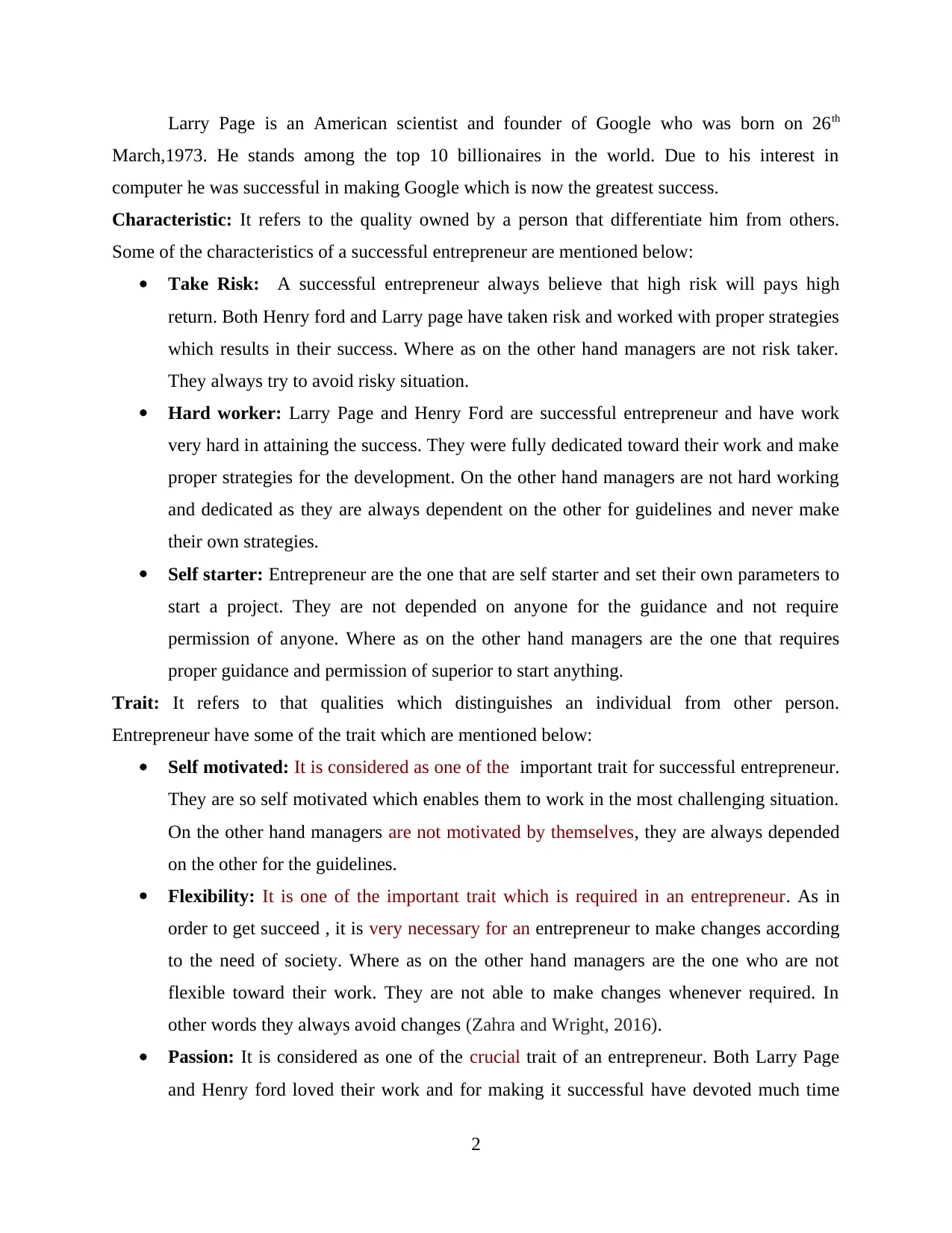
Larry Page is an American scientist and founder of Google who was born on 26th
March,1973. He stands among the top 10 billionaires in the world. Due to his interest in
computer he was successful in making Google which is now the greatest success.
Characteristic: It refers to the quality owned by a person that differentiate him from others.
Some of the characteristics of a successful entrepreneur are mentioned below:
Take Risk: A successful entrepreneur always believe that high risk will pays high
return. Both Henry ford and Larry page have taken risk and worked with proper strategies
which results in their success. Where as on the other hand managers are not risk taker.
They always try to avoid risky situation.
Hard worker: Larry Page and Henry Ford are successful entrepreneur and have work
very hard in attaining the success. They were fully dedicated toward their work and make
proper strategies for the development. On the other hand managers are not hard working
and dedicated as they are always dependent on the other for guidelines and never make
their own strategies.
Self starter: Entrepreneur are the one that are self starter and set their own parameters to
start a project. They are not depended on anyone for the guidance and not require
permission of anyone. Where as on the other hand managers are the one that requires
proper guidance and permission of superior to start anything.
Trait: It refers to that qualities which distinguishes an individual from other person.
Entrepreneur have some of the trait which are mentioned below:
Self motivated: It is considered as one of the important trait for successful entrepreneur.
They are so self motivated which enables them to work in the most challenging situation.
On the other hand managers are not motivated by themselves, they are always depended
on the other for the guidelines.
Flexibility: It is one of the important trait which is required in an entrepreneur. As in
order to get succeed , it is very necessary for an entrepreneur to make changes according
to the need of society. Where as on the other hand managers are the one who are not
flexible toward their work. They are not able to make changes whenever required. In
other words they always avoid changes (Zahra and Wright, 2016).
Passion: It is considered as one of the crucial trait of an entrepreneur. Both Larry Page
and Henry ford loved their work and for making it successful have devoted much time
2
March,1973. He stands among the top 10 billionaires in the world. Due to his interest in
computer he was successful in making Google which is now the greatest success.
Characteristic: It refers to the quality owned by a person that differentiate him from others.
Some of the characteristics of a successful entrepreneur are mentioned below:
Take Risk: A successful entrepreneur always believe that high risk will pays high
return. Both Henry ford and Larry page have taken risk and worked with proper strategies
which results in their success. Where as on the other hand managers are not risk taker.
They always try to avoid risky situation.
Hard worker: Larry Page and Henry Ford are successful entrepreneur and have work
very hard in attaining the success. They were fully dedicated toward their work and make
proper strategies for the development. On the other hand managers are not hard working
and dedicated as they are always dependent on the other for guidelines and never make
their own strategies.
Self starter: Entrepreneur are the one that are self starter and set their own parameters to
start a project. They are not depended on anyone for the guidance and not require
permission of anyone. Where as on the other hand managers are the one that requires
proper guidance and permission of superior to start anything.
Trait: It refers to that qualities which distinguishes an individual from other person.
Entrepreneur have some of the trait which are mentioned below:
Self motivated: It is considered as one of the important trait for successful entrepreneur.
They are so self motivated which enables them to work in the most challenging situation.
On the other hand managers are not motivated by themselves, they are always depended
on the other for the guidelines.
Flexibility: It is one of the important trait which is required in an entrepreneur. As in
order to get succeed , it is very necessary for an entrepreneur to make changes according
to the need of society. Where as on the other hand managers are the one who are not
flexible toward their work. They are not able to make changes whenever required. In
other words they always avoid changes (Zahra and Wright, 2016).
Passion: It is considered as one of the crucial trait of an entrepreneur. Both Larry Page
and Henry ford loved their work and for making it successful have devoted much time
2
Paraphrase This Document
Need a fresh take? Get an instant paraphrase of this document with our AI Paraphraser
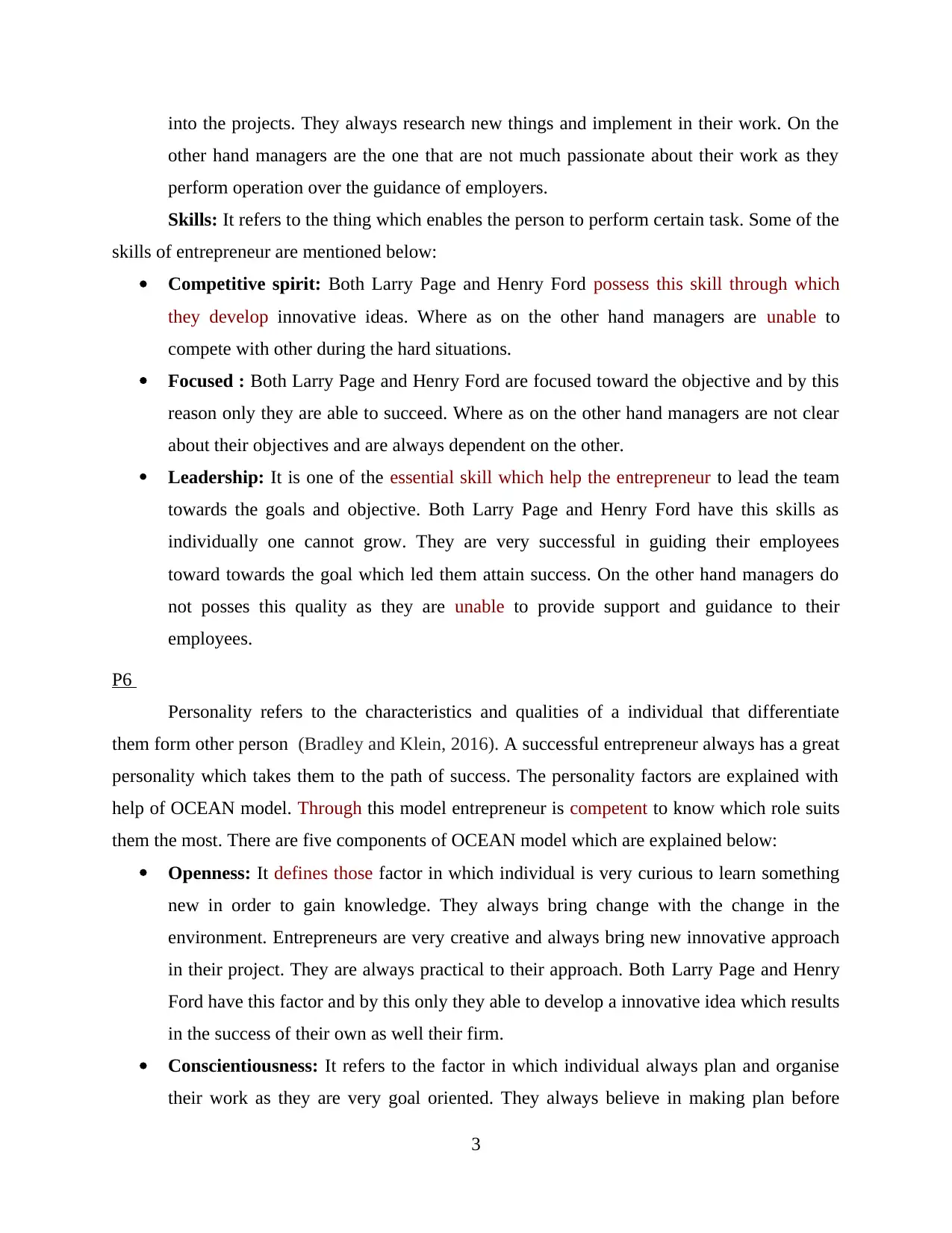
into the projects. They always research new things and implement in their work. On the
other hand managers are the one that are not much passionate about their work as they
perform operation over the guidance of employers.
Skills: It refers to the thing which enables the person to perform certain task. Some of the
skills of entrepreneur are mentioned below:
Competitive spirit: Both Larry Page and Henry Ford possess this skill through which
they develop innovative ideas. Where as on the other hand managers are unable to
compete with other during the hard situations.
Focused : Both Larry Page and Henry Ford are focused toward the objective and by this
reason only they are able to succeed. Where as on the other hand managers are not clear
about their objectives and are always dependent on the other.
Leadership: It is one of the essential skill which help the entrepreneur to lead the team
towards the goals and objective. Both Larry Page and Henry Ford have this skills as
individually one cannot grow. They are very successful in guiding their employees
toward towards the goal which led them attain success. On the other hand managers do
not posses this quality as they are unable to provide support and guidance to their
employees.
P6
Personality refers to the characteristics and qualities of a individual that differentiate
them form other person (Bradley and Klein, 2016). A successful entrepreneur always has a great
personality which takes them to the path of success. The personality factors are explained with
help of OCEAN model. Through this model entrepreneur is competent to know which role suits
them the most. There are five components of OCEAN model which are explained below:
Openness: It defines those factor in which individual is very curious to learn something
new in order to gain knowledge. They always bring change with the change in the
environment. Entrepreneurs are very creative and always bring new innovative approach
in their project. They are always practical to their approach. Both Larry Page and Henry
Ford have this factor and by this only they able to develop a innovative idea which results
in the success of their own as well their firm.
Conscientiousness: It refers to the factor in which individual always plan and organise
their work as they are very goal oriented. They always believe in making plan before
3
other hand managers are the one that are not much passionate about their work as they
perform operation over the guidance of employers.
Skills: It refers to the thing which enables the person to perform certain task. Some of the
skills of entrepreneur are mentioned below:
Competitive spirit: Both Larry Page and Henry Ford possess this skill through which
they develop innovative ideas. Where as on the other hand managers are unable to
compete with other during the hard situations.
Focused : Both Larry Page and Henry Ford are focused toward the objective and by this
reason only they are able to succeed. Where as on the other hand managers are not clear
about their objectives and are always dependent on the other.
Leadership: It is one of the essential skill which help the entrepreneur to lead the team
towards the goals and objective. Both Larry Page and Henry Ford have this skills as
individually one cannot grow. They are very successful in guiding their employees
toward towards the goal which led them attain success. On the other hand managers do
not posses this quality as they are unable to provide support and guidance to their
employees.
P6
Personality refers to the characteristics and qualities of a individual that differentiate
them form other person (Bradley and Klein, 2016). A successful entrepreneur always has a great
personality which takes them to the path of success. The personality factors are explained with
help of OCEAN model. Through this model entrepreneur is competent to know which role suits
them the most. There are five components of OCEAN model which are explained below:
Openness: It defines those factor in which individual is very curious to learn something
new in order to gain knowledge. They always bring change with the change in the
environment. Entrepreneurs are very creative and always bring new innovative approach
in their project. They are always practical to their approach. Both Larry Page and Henry
Ford have this factor and by this only they able to develop a innovative idea which results
in the success of their own as well their firm.
Conscientiousness: It refers to the factor in which individual always plan and organise
their work as they are very goal oriented. They always believe in making plan before
3
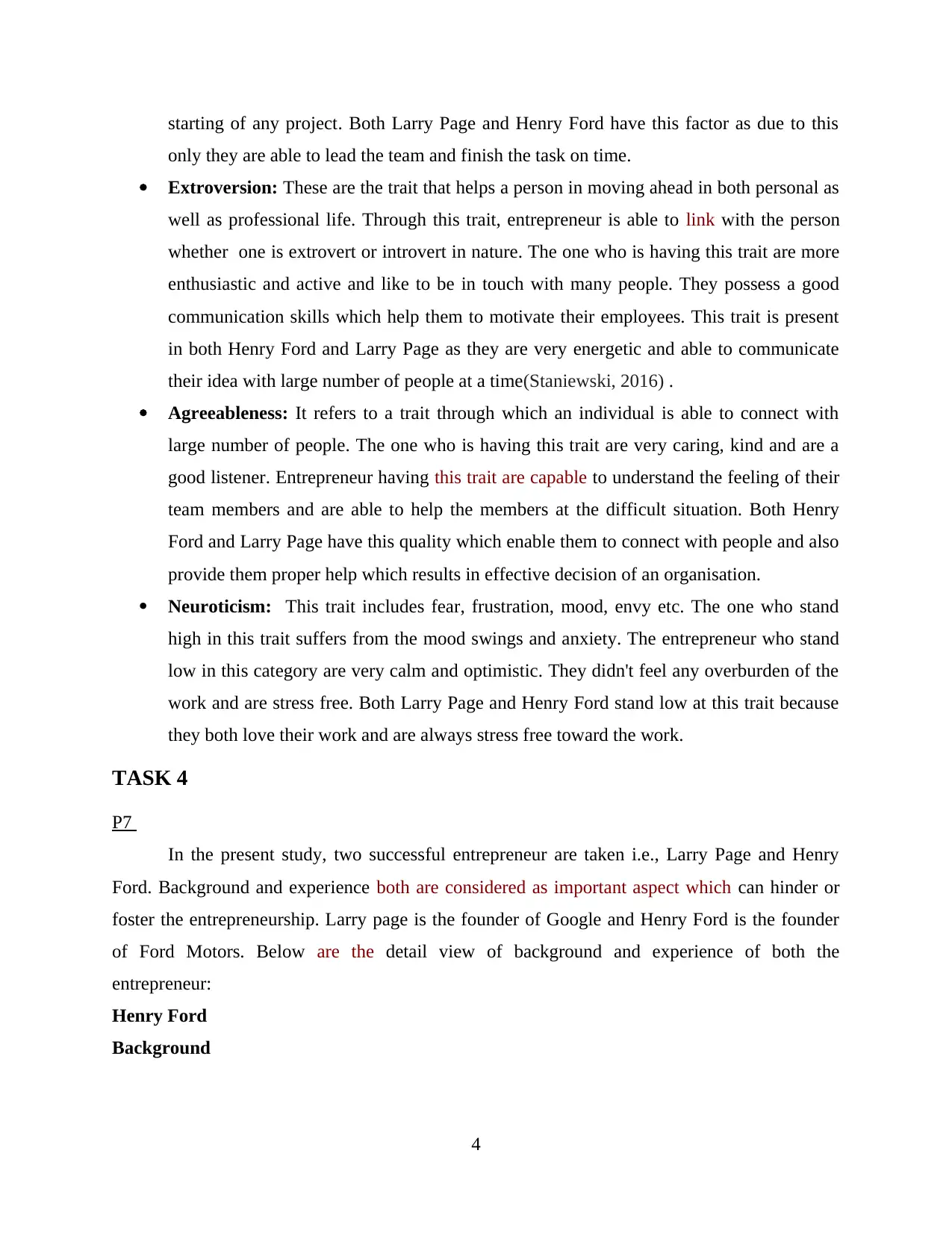
starting of any project. Both Larry Page and Henry Ford have this factor as due to this
only they are able to lead the team and finish the task on time.
Extroversion: These are the trait that helps a person in moving ahead in both personal as
well as professional life. Through this trait, entrepreneur is able to link with the person
whether one is extrovert or introvert in nature. The one who is having this trait are more
enthusiastic and active and like to be in touch with many people. They possess a good
communication skills which help them to motivate their employees. This trait is present
in both Henry Ford and Larry Page as they are very energetic and able to communicate
their idea with large number of people at a time(Staniewski, 2016) .
Agreeableness: It refers to a trait through which an individual is able to connect with
large number of people. The one who is having this trait are very caring, kind and are a
good listener. Entrepreneur having this trait are capable to understand the feeling of their
team members and are able to help the members at the difficult situation. Both Henry
Ford and Larry Page have this quality which enable them to connect with people and also
provide them proper help which results in effective decision of an organisation.
Neuroticism: This trait includes fear, frustration, mood, envy etc. The one who stand
high in this trait suffers from the mood swings and anxiety. The entrepreneur who stand
low in this category are very calm and optimistic. They didn't feel any overburden of the
work and are stress free. Both Larry Page and Henry Ford stand low at this trait because
they both love their work and are always stress free toward the work.
TASK 4
P7
In the present study, two successful entrepreneur are taken i.e., Larry Page and Henry
Ford. Background and experience both are considered as important aspect which can hinder or
foster the entrepreneurship. Larry page is the founder of Google and Henry Ford is the founder
of Ford Motors. Below are the detail view of background and experience of both the
entrepreneur:
Henry Ford
Background
4
only they are able to lead the team and finish the task on time.
Extroversion: These are the trait that helps a person in moving ahead in both personal as
well as professional life. Through this trait, entrepreneur is able to link with the person
whether one is extrovert or introvert in nature. The one who is having this trait are more
enthusiastic and active and like to be in touch with many people. They possess a good
communication skills which help them to motivate their employees. This trait is present
in both Henry Ford and Larry Page as they are very energetic and able to communicate
their idea with large number of people at a time(Staniewski, 2016) .
Agreeableness: It refers to a trait through which an individual is able to connect with
large number of people. The one who is having this trait are very caring, kind and are a
good listener. Entrepreneur having this trait are capable to understand the feeling of their
team members and are able to help the members at the difficult situation. Both Henry
Ford and Larry Page have this quality which enable them to connect with people and also
provide them proper help which results in effective decision of an organisation.
Neuroticism: This trait includes fear, frustration, mood, envy etc. The one who stand
high in this trait suffers from the mood swings and anxiety. The entrepreneur who stand
low in this category are very calm and optimistic. They didn't feel any overburden of the
work and are stress free. Both Larry Page and Henry Ford stand low at this trait because
they both love their work and are always stress free toward the work.
TASK 4
P7
In the present study, two successful entrepreneur are taken i.e., Larry Page and Henry
Ford. Background and experience both are considered as important aspect which can hinder or
foster the entrepreneurship. Larry page is the founder of Google and Henry Ford is the founder
of Ford Motors. Below are the detail view of background and experience of both the
entrepreneur:
Henry Ford
Background
4
⊘ This is a preview!⊘
Do you want full access?
Subscribe today to unlock all pages.

Trusted by 1+ million students worldwide
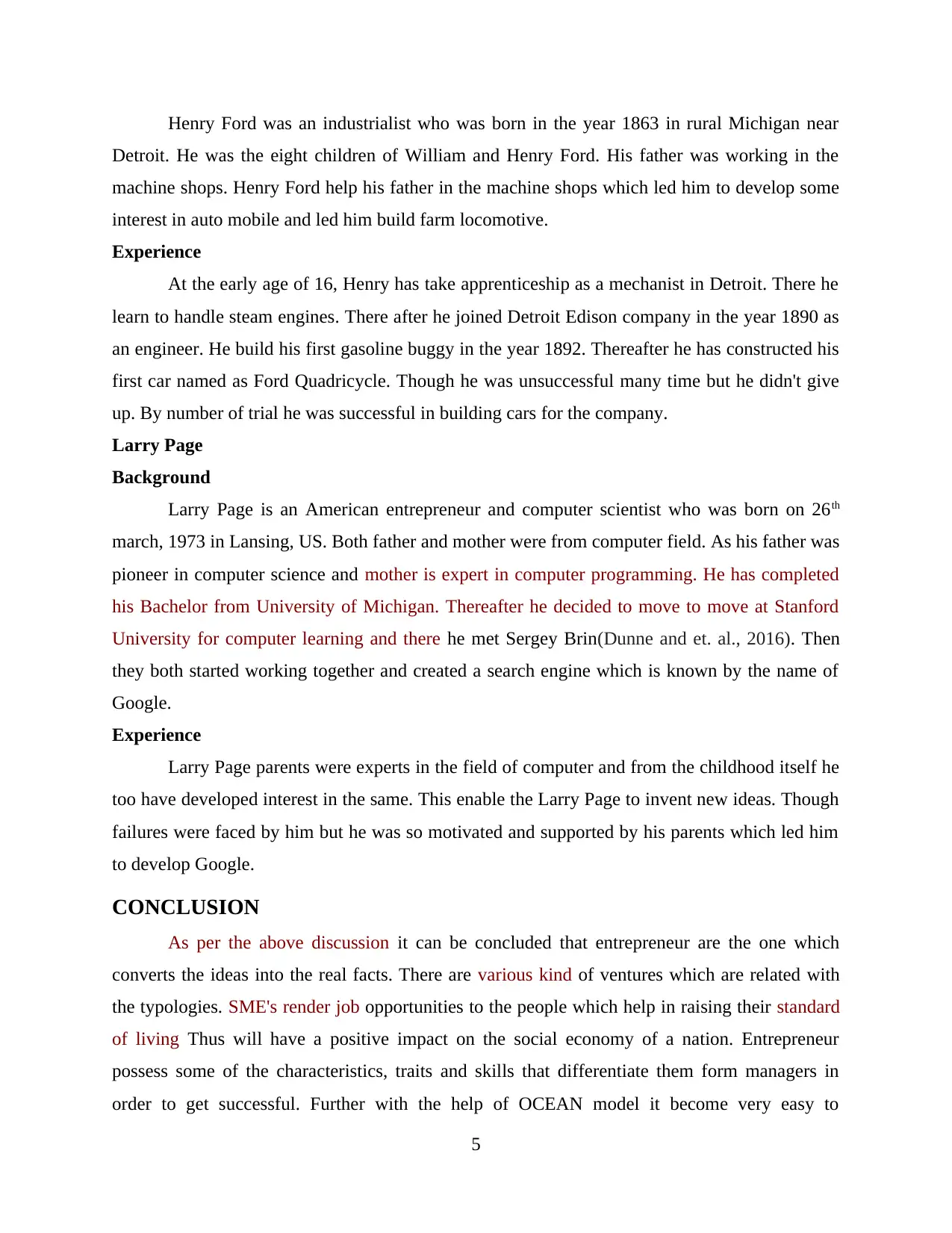
Henry Ford was an industrialist who was born in the year 1863 in rural Michigan near
Detroit. He was the eight children of William and Henry Ford. His father was working in the
machine shops. Henry Ford help his father in the machine shops which led him to develop some
interest in auto mobile and led him build farm locomotive.
Experience
At the early age of 16, Henry has take apprenticeship as a mechanist in Detroit. There he
learn to handle steam engines. There after he joined Detroit Edison company in the year 1890 as
an engineer. He build his first gasoline buggy in the year 1892. Thereafter he has constructed his
first car named as Ford Quadricycle. Though he was unsuccessful many time but he didn't give
up. By number of trial he was successful in building cars for the company.
Larry Page
Background
Larry Page is an American entrepreneur and computer scientist who was born on 26th
march, 1973 in Lansing, US. Both father and mother were from computer field. As his father was
pioneer in computer science and mother is expert in computer programming. He has completed
his Bachelor from University of Michigan. Thereafter he decided to move to move at Stanford
University for computer learning and there he met Sergey Brin(Dunne and et. al., 2016). Then
they both started working together and created a search engine which is known by the name of
Google.
Experience
Larry Page parents were experts in the field of computer and from the childhood itself he
too have developed interest in the same. This enable the Larry Page to invent new ideas. Though
failures were faced by him but he was so motivated and supported by his parents which led him
to develop Google.
CONCLUSION
As per the above discussion it can be concluded that entrepreneur are the one which
converts the ideas into the real facts. There are various kind of ventures which are related with
the typologies. SME's render job opportunities to the people which help in raising their standard
of living Thus will have a positive impact on the social economy of a nation. Entrepreneur
possess some of the characteristics, traits and skills that differentiate them form managers in
order to get successful. Further with the help of OCEAN model it become very easy to
5
Detroit. He was the eight children of William and Henry Ford. His father was working in the
machine shops. Henry Ford help his father in the machine shops which led him to develop some
interest in auto mobile and led him build farm locomotive.
Experience
At the early age of 16, Henry has take apprenticeship as a mechanist in Detroit. There he
learn to handle steam engines. There after he joined Detroit Edison company in the year 1890 as
an engineer. He build his first gasoline buggy in the year 1892. Thereafter he has constructed his
first car named as Ford Quadricycle. Though he was unsuccessful many time but he didn't give
up. By number of trial he was successful in building cars for the company.
Larry Page
Background
Larry Page is an American entrepreneur and computer scientist who was born on 26th
march, 1973 in Lansing, US. Both father and mother were from computer field. As his father was
pioneer in computer science and mother is expert in computer programming. He has completed
his Bachelor from University of Michigan. Thereafter he decided to move to move at Stanford
University for computer learning and there he met Sergey Brin(Dunne and et. al., 2016). Then
they both started working together and created a search engine which is known by the name of
Google.
Experience
Larry Page parents were experts in the field of computer and from the childhood itself he
too have developed interest in the same. This enable the Larry Page to invent new ideas. Though
failures were faced by him but he was so motivated and supported by his parents which led him
to develop Google.
CONCLUSION
As per the above discussion it can be concluded that entrepreneur are the one which
converts the ideas into the real facts. There are various kind of ventures which are related with
the typologies. SME's render job opportunities to the people which help in raising their standard
of living Thus will have a positive impact on the social economy of a nation. Entrepreneur
possess some of the characteristics, traits and skills that differentiate them form managers in
order to get successful. Further with the help of OCEAN model it become very easy to
5
Paraphrase This Document
Need a fresh take? Get an instant paraphrase of this document with our AI Paraphraser

understand about different type of personalities. Lastly it is also concluded that the success and
failure of an entrepreneur also depends upon their background and experience.
6
failure of an entrepreneur also depends upon their background and experience.
6
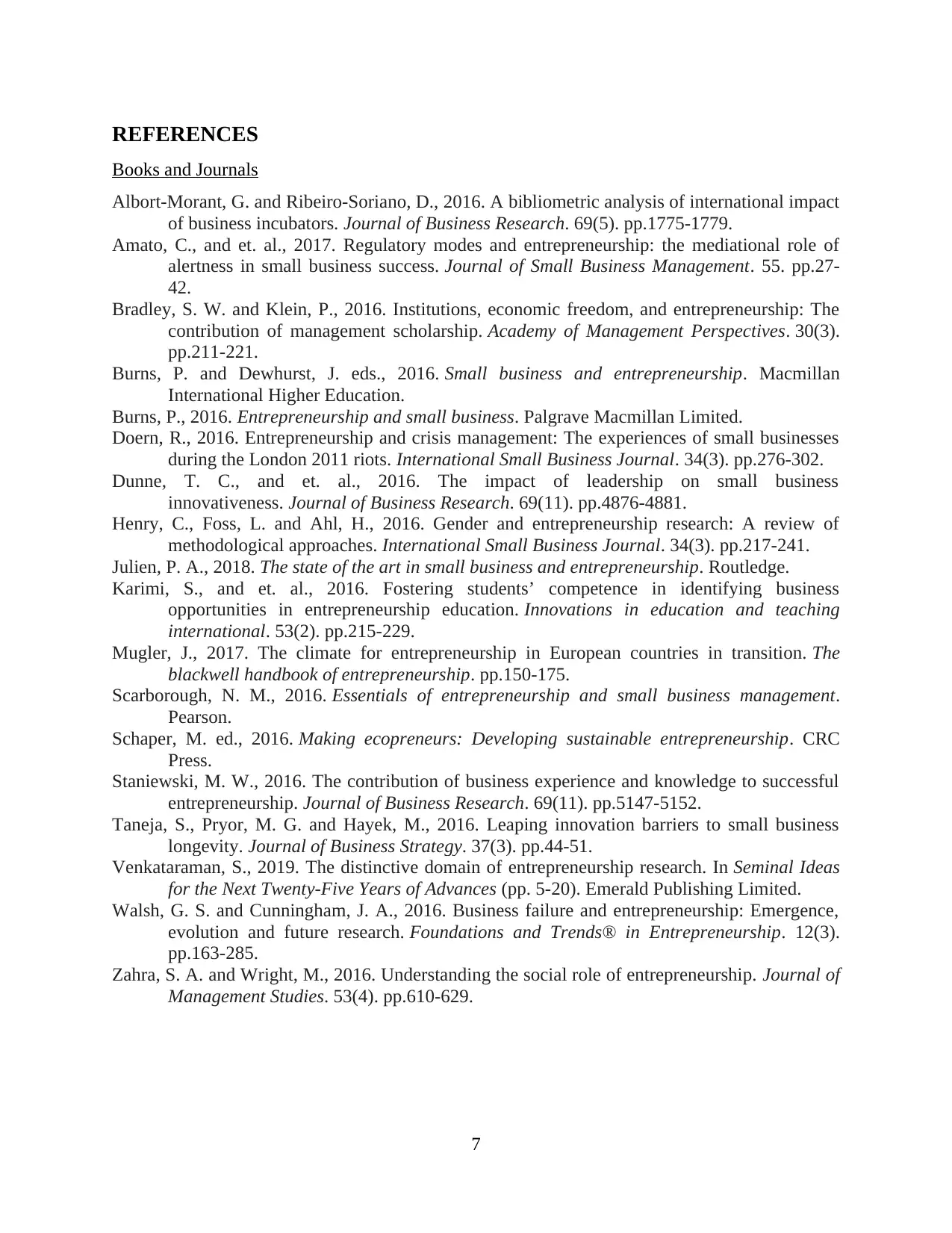
REFERENCES
Books and Journals
Albort-Morant, G. and Ribeiro-Soriano, D., 2016. A bibliometric analysis of international impact
of business incubators. Journal of Business Research. 69(5). pp.1775-1779.
Amato, C., and et. al., 2017. Regulatory modes and entrepreneurship: the mediational role of
alertness in small business success. Journal of Small Business Management. 55. pp.27-
42.
Bradley, S. W. and Klein, P., 2016. Institutions, economic freedom, and entrepreneurship: The
contribution of management scholarship. Academy of Management Perspectives. 30(3).
pp.211-221.
Burns, P. and Dewhurst, J. eds., 2016. Small business and entrepreneurship. Macmillan
International Higher Education.
Burns, P., 2016. Entrepreneurship and small business. Palgrave Macmillan Limited.
Doern, R., 2016. Entrepreneurship and crisis management: The experiences of small businesses
during the London 2011 riots. International Small Business Journal. 34(3). pp.276-302.
Dunne, T. C., and et. al., 2016. The impact of leadership on small business
innovativeness. Journal of Business Research. 69(11). pp.4876-4881.
Henry, C., Foss, L. and Ahl, H., 2016. Gender and entrepreneurship research: A review of
methodological approaches. International Small Business Journal. 34(3). pp.217-241.
Julien, P. A., 2018. The state of the art in small business and entrepreneurship. Routledge.
Karimi, S., and et. al., 2016. Fostering students’ competence in identifying business
opportunities in entrepreneurship education. Innovations in education and teaching
international. 53(2). pp.215-229.
Mugler, J., 2017. The climate for entrepreneurship in European countries in transition. The
blackwell handbook of entrepreneurship. pp.150-175.
Scarborough, N. M., 2016. Essentials of entrepreneurship and small business management.
Pearson.
Schaper, M. ed., 2016. Making ecopreneurs: Developing sustainable entrepreneurship. CRC
Press.
Staniewski, M. W., 2016. The contribution of business experience and knowledge to successful
entrepreneurship. Journal of Business Research. 69(11). pp.5147-5152.
Taneja, S., Pryor, M. G. and Hayek, M., 2016. Leaping innovation barriers to small business
longevity. Journal of Business Strategy. 37(3). pp.44-51.
Venkataraman, S., 2019. The distinctive domain of entrepreneurship research. In Seminal Ideas
for the Next Twenty-Five Years of Advances (pp. 5-20). Emerald Publishing Limited.
Walsh, G. S. and Cunningham, J. A., 2016. Business failure and entrepreneurship: Emergence,
evolution and future research. Foundations and Trends® in Entrepreneurship. 12(3).
pp.163-285.
Zahra, S. A. and Wright, M., 2016. Understanding the social role of entrepreneurship. Journal of
Management Studies. 53(4). pp.610-629.
7
Books and Journals
Albort-Morant, G. and Ribeiro-Soriano, D., 2016. A bibliometric analysis of international impact
of business incubators. Journal of Business Research. 69(5). pp.1775-1779.
Amato, C., and et. al., 2017. Regulatory modes and entrepreneurship: the mediational role of
alertness in small business success. Journal of Small Business Management. 55. pp.27-
42.
Bradley, S. W. and Klein, P., 2016. Institutions, economic freedom, and entrepreneurship: The
contribution of management scholarship. Academy of Management Perspectives. 30(3).
pp.211-221.
Burns, P. and Dewhurst, J. eds., 2016. Small business and entrepreneurship. Macmillan
International Higher Education.
Burns, P., 2016. Entrepreneurship and small business. Palgrave Macmillan Limited.
Doern, R., 2016. Entrepreneurship and crisis management: The experiences of small businesses
during the London 2011 riots. International Small Business Journal. 34(3). pp.276-302.
Dunne, T. C., and et. al., 2016. The impact of leadership on small business
innovativeness. Journal of Business Research. 69(11). pp.4876-4881.
Henry, C., Foss, L. and Ahl, H., 2016. Gender and entrepreneurship research: A review of
methodological approaches. International Small Business Journal. 34(3). pp.217-241.
Julien, P. A., 2018. The state of the art in small business and entrepreneurship. Routledge.
Karimi, S., and et. al., 2016. Fostering students’ competence in identifying business
opportunities in entrepreneurship education. Innovations in education and teaching
international. 53(2). pp.215-229.
Mugler, J., 2017. The climate for entrepreneurship in European countries in transition. The
blackwell handbook of entrepreneurship. pp.150-175.
Scarborough, N. M., 2016. Essentials of entrepreneurship and small business management.
Pearson.
Schaper, M. ed., 2016. Making ecopreneurs: Developing sustainable entrepreneurship. CRC
Press.
Staniewski, M. W., 2016. The contribution of business experience and knowledge to successful
entrepreneurship. Journal of Business Research. 69(11). pp.5147-5152.
Taneja, S., Pryor, M. G. and Hayek, M., 2016. Leaping innovation barriers to small business
longevity. Journal of Business Strategy. 37(3). pp.44-51.
Venkataraman, S., 2019. The distinctive domain of entrepreneurship research. In Seminal Ideas
for the Next Twenty-Five Years of Advances (pp. 5-20). Emerald Publishing Limited.
Walsh, G. S. and Cunningham, J. A., 2016. Business failure and entrepreneurship: Emergence,
evolution and future research. Foundations and Trends® in Entrepreneurship. 12(3).
pp.163-285.
Zahra, S. A. and Wright, M., 2016. Understanding the social role of entrepreneurship. Journal of
Management Studies. 53(4). pp.610-629.
7
⊘ This is a preview!⊘
Do you want full access?
Subscribe today to unlock all pages.

Trusted by 1+ million students worldwide
1 out of 9
Related Documents
Your All-in-One AI-Powered Toolkit for Academic Success.
+13062052269
info@desklib.com
Available 24*7 on WhatsApp / Email
![[object Object]](/_next/static/media/star-bottom.7253800d.svg)
Unlock your academic potential
Copyright © 2020–2025 A2Z Services. All Rights Reserved. Developed and managed by ZUCOL.





